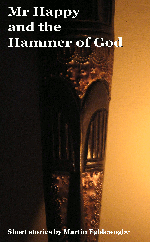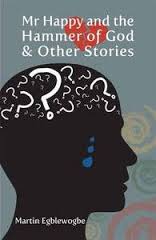
I consider Mr. Happy and The Hammer of God (2008) a significant publication in the contemporary Ghanaian literary scene. The emerging talent of its author, Martin Egblewogbe, seems rather immense.
But. Let me get my issues out of the way.
- Martin Egblewogbe cannot write women. I find his portrayal of women characters problematic. So I worry that he will join the ranks of Ayi Kwei Armah (one of Ghana’s iconic authors) and Chinua Achebe who both write highly imaginatively, compelling and entertaining African stories but who fail miserably at the portrayal of women. But all is not lost.Martin might see this post and read that Njabulo Ndebele, Nuruddin Farah, Sembene Ousmane and Ngugi wa Thiong’o (certainly in Wizard of the Crow), all exceptional male writers and favorites of mine, can and do write women well. Perhaps, he might decide to pick up a book by one of the latter four. I’m keeping my fingers crossed. A reader can always hope.
-

Ayebia Publishing Cover Mr. Happy and The Hammer of God is a self-published book available only in Ghana. I do not know why the author did not choose the traditional publishing route. Perhaps he found the Ghanaian/African publishing scene riddled with too many mines and choose to take a safer route which he could control. I certainly sympathize. But the very limited reach of this book means that most people who would have liked to read this book, will not be able to. A pity indeed. (NOTE: the collection has been re-published by Ayebia Clarke Publishing!)
Now to the book.
Mr Happy and the Hammer of God is a collection of short stories divided into two sections. The first eight stories are bundled under the section headed, “They call am ‘lie lie fight’”. In pidgin English, anything “lie lie” is fraudulent. And these stories deal with fraud in one form or the other. For example”:
- The cheekily titled “To-morrow” in which a man who is fed-up with his life attempts to eliminate his tomorrows.
- Coffee at the Hilltop Café in which the man witnesses a scene between his ex and her lover.
Today I was saddened, on taking my first sip, to glimpse the couple inside the café. My afternoon was nearly spoiled, but I quietly drank my coffee, determined not to disturb my afternoon leisure. So I share glances between the street and the inside of the cafe , and soon it is all the same to me, whether she is there, or whether she is not there. I enjoy my afternoon cup nearly as much as I have always done.”
I have presented the prior relationship between the observer and the observed as a non-familial love relationship. Yet the story can also be read as a parent seeing a daughter. Either way, betrayal of love is the fraud here. A most touching and quiet story that is well-matched to the character and the scenery. Our observer’s bravado diminishes by the end of the story.
- “Pharmaceutical Intervention” in which a girl feels guilty about an abortion. Quite a harrowing description of the procurement and the performance of an unsafe abortion.
- “Down Wind” about a man stuck in a phone book during a deluge, who is repeatedly told that he has committed a crime. However, he does not remember committing the crime. Both he and the reader are never told the nature of the crime.
- “Twilight” in which a man facing death wonders “what it has all been about? This is the question that makes me doubt that it has all been worth the time”.
The second section titled “Paradise by the Dashboard Light” has the three longest stories and include:
- The title story, “Mr Happy and the Hammer of God’” is about a young man who is haunted and hounded throughout his life by a demon named Mephisto. It is a thorough examination of Ghanaian society, parenting, Christianity and traditional beliefs. A character who confronts his inner self and though suffering, tries to come to grips with his collapsing mental state.
- In “Three Conversation with Ayuba”, Mhan loses his sense of contentment and seeks out the phantom Ayuba for a solution:
He would suddenly feel a deep sense of unease that quickly grew into a terrifying despair; these was an abyss yawning at the edge of his consciousness…. these periods of unhappiness grew longer until each day was filled with misery. His life teetered on the precipice of insanity. Medical attention was recommended, but Mhan knew that his problem was beyond the ordinary. It was a disease of the soul, a problem striking him from the Otherworld; that was where a solution would be found. Little by little, Mhan became conscious of the existence of Ayuba, in a manner similar to the awareness of his unhappiness. It began as an idea about someone who would save him from this trouble….Where had the idea of Ayuba come from?
These stories are not burdened by the “African” condition. And those looking for a familiar Ghanaian/African setting will have to look elsewhere. And yet I recognized my street, my city and my people. Collectively, this book is a portrayal of our inner struggles, torments and our psyche. Who are you, what are you, how did you get here and where do you go from here? These are the questions that Egblewogbe means to ask. He employs some familiar tropes to ask these questions. But one can also read that he is trying out new forms so as to settle the right vehicle for his investigation. Towards the end of my reading, I sensed a preference for the experimental approach. And that would be refreshing and new for Ghanaian literature. Time and again, the author turns to the metaphysical and how it relates to our minds, our states of being and our pursuit of happiness. Here is a Ghanaian author who wants to know how it all feels? He is asking this using wit and humor; and he bravely and sensitively continues to engage with us even when the answer is an outpouring of misery and desperation.
And of course, I appreciate that he chose the short story to express himself. I highly recommend the well-written and wildly entertaining Mr. Happy and the Hammer of God.
[…] sit: New Ghanaian Poets edited by Martin Egblewogbe and Laban Carrick Hill – Martin, author of Mr Happy and the Hammer of God, hosts a Sunday evening radio program on literary stuff and some months ago I appeared on the show […]
LikeLike
[…] From my review of the collection – “These stories are not burdened by the “African” condition. And those looking for a familiar Ghanaian/African setting will have to look elsewhere. And yet I recognized my street, my city and my people. Collectively, this book is a portrayal of our inner struggles, torments and our psyche. …Time and again, the author turns to the metaphysical and how it relates to our minds, our states of being and our pursuit of happiness. Here is a Ghanaian author who wants to know how it all feels? He is asking this using wit and humor; and he bravely and sensitively continues to engage with us even when the answer is an outpouring of misery and desperation.” […]
LikeLike
[…] of Mr Happy and the Hammer of God, a collection of short stories which I enjoyed immensely and reviewed here at Kinna Reads. Some of what I had to […]
LikeLike
[…] Mr Happy and the Hammer of God by Martin Egblewogbe – A fresh new voice in Ghanaian literature. […]
LikeLike
[…] Mr Happy and the Hammer of God by Martin Egblewogbe (here at Kinna Reads) […]
LikeLike
Too bad he’s not so good at writing women – like you I always hope readers will improve at that. Also, I must read more of the authors you say are so good. Sounds like a really interesting collection though and hopefully some day it will make it to Canada 😉
LikeLike
That’s it I think: reading and writing women well probably are inter-related. His approach in some of the stories is just different. Many writers find self-publishing easier in Ghana and sometimes I think that at least there is that route. We do hope that he goes traditional next so that more people can read his books.
LikeLike
It sounds like a great blend of familiar tropes with a dab of experimentalism. I enjoyed reading your thoughts about the collection and share your enthusiasm for short stories well-done.
LikeLike
More experimental lit and generally more genre is needed in African literature. Nothing really beats a well-done short story. Nothing.
LikeLike
Kinna you make me want to visit my review of this book. I loved every single piece. It is so different from the everyday stories we hear. It makes me feel happy, at least to know that the African often think of his existence, where he came from and where he’s going, the metaphysical in an un-poverty way. That we also seek these inner balance and not just be saddled down with the idea of wealth and riches. In fact, in most of our villages, where the writers of poverty base their stories, poverty has never been a discussion point; it is topics as these, those explored here that rage. What would you tell a person who visits the traditionalist to tell him about his future? And I’m glad that Martin wrote these stories. I hope that one day this will be republished under a bigger publisher and achieve a wider distribution for Martin’s talents needs to be appreciated by many.
LikeLike
I know that this is one of your all-time favorite African books. Quite a tour de force! Perhaps we should petition Martin to republished the collection for wider consumption.
LikeLike
great book and a writer that is new to me , I ll have a review later in week but a older Ghanian novel ,all the best stu
LikeLike
PS, great Idea the Ghanaian Lit week
LikeLike
Oh, thank you.
LikeLike
Beyond the issue you’ve raised this does sound like a book to get behind, shame as you say it will have limited success due to its publishing route.
LikeLike
It is a shame. But hopefully, his work will be available for the consumption of a wider audience.
LikeLike
[…] Mr Happy and The hammer of God by Martin Egblewogbe (here at Kinna Reads) […]
LikeLike